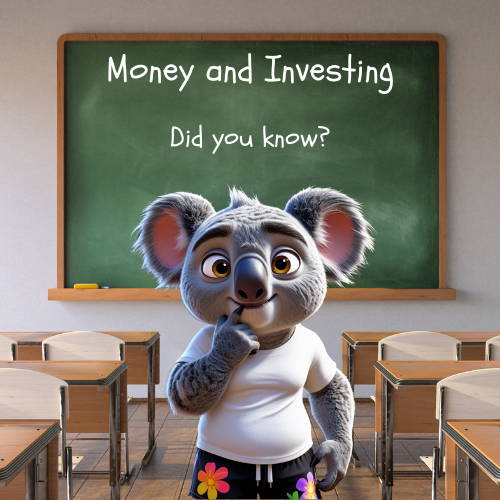Give Your Kids the Financial Head Start They Deserve!
Fun, interactive lessons that teach kids and young adults how to save, invest, and grow their money like pros.
The Problem: Why Most Kids Don’t Learn About Money
There are three main reasons many children miss out on financial education:
- Schools Don’t Prioritise It – While some schools teach basic economics, very few include practical lessons on personal finance, budgeting, and investing.
- Parents Feel Unqualified – Many adults struggle with their own finances, making them hesitant to teach their children.
- Money Is a Taboo Topic – In some families, talking about money feels uncomfortable or even inappropriate.
Unfortunately, avoiding the topic doesn’t protect your child — it leaves them unprepared for the real world.
Why it's essential to teach your kids about money and investing!
Without financial education, young people risk falling into debt, missing opportunities to save, and struggling with money as adults.
Hey Money Adventurers!
I’m Ozzy the Koala 🐨 — your fun-loving mate here to help you crack the secrets of money, from your very first piggy bank to your first big investment!
Whether you’re:
🌟
5 to 7 years old and just starting to explore coins and notes,
🚀
8 to 12 years old and ready to level up your money skills, or
🎯
13 to 18
years old and keen to take charge of your financial future
you’re in the right place.
Here, we turn learning about money into a real adventure with awesome games, cool challenges, and hands-on lessons that make sense.
What You’ll Learn
Money Skills for the Real World
🏦 What is Money?
💰 How to Save & Budget
📈 Investing Made Simple
🛍️ Needs vs. Wants
📊 Starting a Side Hustle
🧾 Taxes & Bank Accounts
🎯 Setting Goals
💳 Smart Spending Habits
Together, we’ll dive into:
💰
How to earn and save,
🎯 How to make smart choices (so you don’t blow it all on lollies or shoes), and
🚀 How to grow your money for things you dream about — whether it’s a shiny new bike or a future trip around the world.
Remember, it’s not just about spending — it’s about building money smarts for life.
So come along, join me, and let’s make mastering money wildly fun!
START HERE
Learn By Age
Money Lessons That Grow With You
Whether you're just starting out with coins or dreaming of building your first investment portfolio, we've got age-appropriate tools to help you grow.
Learn about coins, saving jars, and fun spending choices.
Budget your pocket money, save for goals, and explore ways to earn.
Build your money mindset with real-world investing tips and career ideas.
Play & Learn
Games, Quizzes and Challenges
Learn by doing!
Explore our free interactive games that make saving, spending, and investing fun and easy to understand.
🎯 Budget Buster Game – Try to budget your weekly allowance!
📈 Stock Market Simulator – Make fictional trades and grow your portfolio.
🧠 Money Mind Quiz – Find out what kind of saver or spender you are.
Parents & Teachers
Plans, Worksheets and Guides
We make it easy for parents and educators to teach kids about money.
Get lesson plans, printable worksheets, and age-based guides—all in one place.

Why Teaching Money and Investing to Kids and Teenagers Matters Now More Than Ever!
In an age of tap-and-go, online subscriptions, and digital wallets, understanding money is no longer optional—it’s essential.
Yet for many young Australians, financial literacy is still a mystery.
By introducing key money and investing concepts early, we empower children not just to count coins or save for a toy, but to build lifelong habits that set them up for success. Money doesn’t have to be a taboo topic—it can be playful, practical, and even empowering. And the earlier we start the conversation, the better prepared our next generation will be to face a future that’s fast, fluid, and financially complex.
5 to 7
From the foundational years of 5 to 7, kids are already noticing how money works—watching parents pay for groceries, earn wages, or tap a card at a café.
This is the perfect time to introduce fun and simple ideas like “needs vs. wants,” coin recognition, and basic saving goals. Visual tools like jars, charts, and role-play help young minds connect behaviour with outcomes.
Teaching them to pause, plan, and save—even in small ways—plants the seed for smarter spending later in life.
8 to 12
As kids move into the 8 to 12 range, they’re increasingly curious about independence, value, and earning.
This is the golden window for hands-on learning: pocket money, budgeting games, and starting tiny businesses like lemonade stands or dog-walking gigs.
These pre-teens are not just ready—they’re eager to learn how money flows. They start to grasp the bigger picture: the value of effort, the role of savings, and how money can be used not just to spend, but to grow.
13 to 17
For teens aged 13 to 17, the stakes get real—and so does their potential.
Whether they’re considering their first job, planning a gap year, or opening a bank account, they’re navigating decisions that have real financial consequences. This is the time to introduce compound interest, investing basics, superannuation, and even tax. It’s not about turning them into stockbrokers. It’s about giving them the confidence and tools to take control of their future.
With the right guidance, they can become not just consumers, but conscious, confident investors in their own lives.
Teaching money and investing isn't about numbers—it’s about nurturing independence, responsibility, and resilience. It’s about giving every Australian child, no matter their background, the chance to shape a better financial future.
For parents and teachers, the role is simple but powerful: start the conversations, offer the tools, and support the journey.
Whether your child is 5 or 17, the time to begin is now.
Because when we teach kids how to manage money, we teach them how to manage life.
Join the Money Explorers Crew
Get cool tips, new games, and fun challenges delivered to your inbox!








